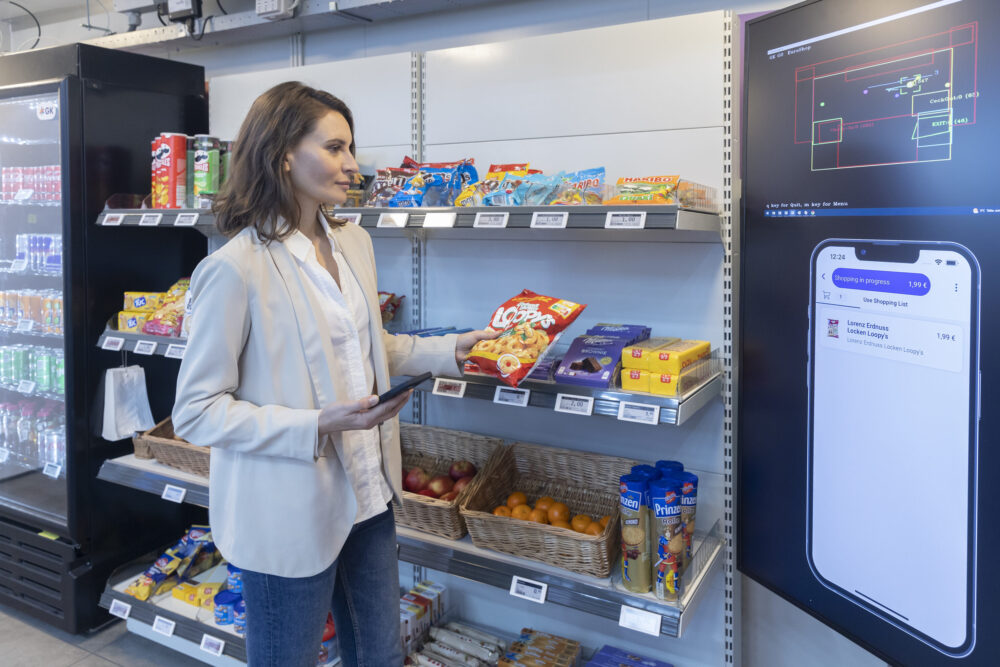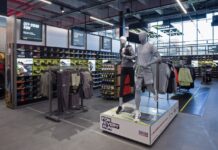They are able to analyse data, write product descriptions, answer shoppers’ questions or write codes – and all of this practically “on demand”: generative AI and voice-controlled AI Bots will change the way humans handle software fundamentally. EuroCIS 2024 shows how retail companies can benefit from this rapid development.
Until recently Jonas Andrulis and his company Aleph Alpha were hardly known in retail – this should have changed since the latest round of funding. Early November saw Bosch, SAP and the Schwarz Group jointly invest just under € 470 million in this German AI start-up. Since 2019 Aleph Alpha has developed major AI voice models comparable to ChatGPT by OpenAI or Bard by Google. The German company focuses on safe industrial applications, operating a commercial AI data processing centre near Heidelberg.

In future, the new shareholders want to integrate this AI “made in Germany” in their own processes and products to increase productivity and improve customer service. In addition to Lidl and Kaufland outlets the Schwarz Group runs its own production sites and one disposal company with 66 sorting and recycling plants. This retail company sees possible areas of application in AI-generated product descriptions. But AI is also to be deployed for the optimisation of production volumes and transport routes or in predictive maintenance of connected chilling cabinets, manufacturing sites or sorting lines.
AI-relevant product categories such as Analytics, ERP and supply chain management will also be focal themes at EuroCIS again in 2024. Long-established exhibitors such as BE-terna, Blue Yonder, Remira and Revionics will present current solutions for forecast-assisted inventory and production planning, Predictive Maintenance or Dynamic Pricing as a function of such factors as demand, stock, durability or seasonality of an article. Machine Learning and big data play a pivotal role in all of these applications. For Michael Feindt, the former founder and current Strategic Advisor of Blue Yonder, self-learning algorithms have long outperformed humans when it comes to delivering precise forecasts and decisions depending on numerous variables in complex or non-linear systems.
To this end, however, humans have to speak the language of the machine: so as to operate the complex and high-performance software tools, users so far require deep programme knowledge and an understanding of the underlying analysis methods. The new generation of AI, which alongside major US groups Aleph Alpha and a handful of European start-ups are also working on, might change this in future. The so-called Large Language Models – such as OpenAI’s GPT family or Luminous by Aleph Alpha – are trained with huge amounts of data and are capable of understanding questions in natural language and answering them within a context more or less meaningfully. This makes them the simplest imaginable user interface of all times: simply ask the bot and off you go.
“Generative AI will fundamentally change the way humans work with our software,” Christian Klein, SAP Board Spokesman, told the Handelsblatt recently. In future, the software group will integrate AI assistants in the complete cloud-based SAP portfolio from HR to finance, supply chain management, purchasing and customer journey. “Joule”, the new bot, uses natural language, by SAP accounts, and understands not only user’s instructions but also the business administration context. The smart assistant, they say, searches data from various systems very quickly and puts them in a context to gain smarter insights. It is anticipated that initial chat applications will be available from the end of the year so EuroCIS visitors will already be able to put Joule to the test at the SAP stand. By means of SAP Build Code, a generative AI-based development solution, the Walldorf-based software giant also wants to increase developers’ productivity.
At other exhibitors’ stands visitors can also experience how AI makes software handling more intuitive and, hence, more accessible for a broad circle of users. SymphonyAI, for example, an international provider of SaaS analysis software, already uses AI pilots trained with sector-specific data and capable of answering intuitive “What if …” questions. The Danish start-up GoFact supports retail multiples with a cloud-based software that enables fast and fact-based decisions and delivers concrete recommendations for action. The “on-top” solution can simply be added to the existing IT landscape. Likewise, the young Freshflow company presents a Plug & Play solution that food retailers can use to optimise fresh produce orders with AI.
“Generative Artificial Intelligence will impact every industry and its value chain in future,” believes Tim Wirtz, expert for Enterprise Information Systems at the Fraunhofer Institute for Intelligent Analysis and Information Systems IAIS. This German scientific institute does research in the areas of Artificial Intelligence, Machine Learning and Big Data and will be represented at EuroCIS in 2024 for the first time. The German AI experts will be showcasing at their stand an assistant developed to do complex data-analysis enquiries in natural language. “Retail is characterised by data-driven decisions,” says Wirtz. The fact that often only experts can run time and mission-critical business enquiries, he feels, is no longer up to date in the age of ChatGPT & Co. His aim: “By means of AI, staff at all levels will in future be able to have their analytical ad hoc questions answered.”
EuroCIS 2024 will be held in Halls 9 and 10 of Düsseldorf Exhibition Centre and will be open to trade visitors from Tuesday, 27 February, to Thursday, 29 February 2024, daily from 10.00 am to 6.00 pm. 1-day tickets purchased online cost € 28.-, 2-day tickets € 39.-. Students and trainees pay € 15.-. For admission tickets as well as more information on the trade fair go to: www.eurocis-tradefair.com













